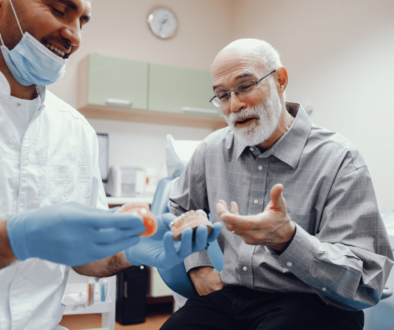Implant Success Secrets Factors That Influence Longevity and Durability

Dental implants can last a lifetime with proper care and attention to detail. Discover the hidden factors that can make or break the success of your implant.
Introduction:
In the realm of restorative dentistry, dental implants have become the gold standard for replacing missing teeth. These marvels of modern dentistry not only restore function but also help preserve facial structure and prevent bone loss. At ADentalOffice.com, we understand that the success of an implant depends not only on the surgical procedure but also on various other factors that can impact its longevity and durability. Through years of experience and successful implant procedures, we’ve unlocked the secrets of implant longevity. By paying close attention to these critical elements, patients and dental professionals can work together to ensure that dental implants last as long as they are designed to.
Whether you are considering dental implants or already have them, these success secrets are vital for maintaining your smile. Let’s delve into the factors that contribute to the success and longevity of dental implants.
The Ten Pillars of Implant Durability
- Quality of Implant Material:
- Biocompatibility: The implant material must be accepted by your body without causing any adverse reactions.
- Durability: High-grade titanium or titanium alloys are preferred for their strength and longevity.
- Corrosion Resistance: The implant should resist corrosion from oral fluids to avoid degradation.
- Surface Technology: Advances in surface etching and coating improve the implant’s bone bonding capabilities.
- Manufacturing Standards: Implants should adhere to stringent manufacturing standards, ensuring their quality.
- Brand and Manufacturer Reputation: Choose implants from reputable brands known for their research and success rates.
- FDA Approval: Ensure the implant is approved by health regulatory authorities like the FDA.
- Expertise of the Dental Surgeon:
- Qualifications: Verify the credentials and specializations of the dental surgeon.
- Experience with Implants: Surgeons with extensive experience in implantology tend to have higher success rates.
- Continued Education: Look for professionals who keep up-to-date with the latest techniques and discoveries.
- Patient Reviews: Positive testimonials can indicate a trustworthy and skilled surgeon.
- Success Rate: Inquire about the surgeon’s past implant success rates.
- Consultation-Quality: A detailed and individualized treatment plan is a good sign of a meticulous surgeon.
- Professional Affiliations: Membership in professional dental associations can indicate a commitment to excellence.
- Pre-Surgical Planning:
- Comprehensive Dental Evaluation: A thorough examination to assess oral health and suitability for implants.
- Imaging Techniques: Utilizing X-rays and CT scans to plan the implant placement and ensure proper bone structure.
- Customized Treatment Planning: Each patient requires an individualized approach to implant surgery.
- Health Assessment: Considering the patient’s overall health and how it may impact the healing process.
- Identification of Risk Factors: Recognizing conditions such as diabetes or osteoporosis that may affect osseointegration.
- Clear Communication: Ensuring the patient understands the procedure, risks, and aftercare.
- Timing of Procedure: Proper scheduling of the surgery to allow for adequate healing from any preparatory procedures.
- Precision in Surgical Technique:
- Aseptic Protocol: Maintaining a sterile environment to prevent infection.
- Incision and Flap Design: Making the least invasive incision to preserve gum tissue.
- Proper Placement: Precise positioning of the implant for optimal function and aesthetics.
- Avoidance of Overheating: Ensuring bone isn’t damaged by heat generated during drilling.
- Stable Insertion: The implant must be seated securely to withstand pressure during osseointegration.
- Minimal Trauma: Protecting surrounding tissues to encourage quick healing.
- Verification of Stability: Checking the stability of the implant immediately after placement.
- Post-Surgical Care:
- Immediate Aftercare: Instructions on managing swelling and preventing infection in the days following surgery.
- Medication Compliance: Taking prescribed medications exactly as directed to manage pain and prevent complications.
- Activity Restrictions: Avoid strenuous activity and impact on the surgical site during the healing period.
- Follow-Up Appointments: Attending all scheduled follow-ups to monitor healing and address any concerns early.
- Dietary Adjustments: Sticking to a soft diet to avoid undue pressure on the new implant.
- Hydration and Nutrition: Ensuring adequate fluid intake and proper nutrition to aid in healing.
- Smoking Cessation: Avoiding tobacco products which can impair healing and implant integration.
- Oral Hygiene Routine:
- Regular Brushing: Use a soft-bristle toothbrush to clean around the implant site gently.
- Flossing: Employing implant-specific floss or interdental brushes to clean around the abutments.
- Antibacterial Mouthwash: Rinsing with a non-alcoholic, antibacterial mouthwash to reduce the risk of infection.
- Dental Check-Ups: Keeping to a regular dental visit schedule for professional cleaning and monitoring.
- Avoiding Harsh Chemicals: Steering clear oral hygiene products that could irritate the implant site.
- Proper Brushing Technique: Ensure you’re not applying excessive force, which could damage tissues around the implant.
- Special Care Products: Consider the use of water flossers or other special care products recommended by the dentist.
- Lifestyle Considerations:
- Balanced Diet: Maintaining a diet that supports bone health, including adequate calcium and vitamin D intake.
- Managing Chronic Conditions: Keeping systemic diseases like diabetes under control to improve healing and maintenance.
- Limiting Alcohol Consumption: Alcohol can affect the healing process and should be consumed in moderation.
- Stress Management: High-stress levels can impact immune response and healing.
- Regular Exercise: Engaging in regular, moderate exercise to promote overall health, including oral health.
- Avoiding Teeth Grinding: Using a mouthguard if bruxism (teeth grinding) is a concern to prevent undue pressure on implants.
- Protecting the Face: Wearing mouthguards during sports and other activities to prevent facial trauma.
- Long-term Maintenance:
- Annual Check-Ups: Visiting the dentist yearly or as recommended for implant inspection and professional cleaning.
- Prompt Treatment of Issues: Addressing any dental issues immediately to prevent them from affecting the implant.
- Regular X-rays: Periodic imaging to monitor the implant and surrounding bone structure.
- Replacement of Worn Parts: Timely replacement of any prosthetic parts of the implant that may wear out over time.
- Oral Health Education: Staying informed about the best practices in dental care.
- Avoiding Hard Foods: Steering clear of biting into hard foods that could damage the implant or the crown.
- Staying Informed: Keeping abreast of any new recommendations or care techniques for dental implants.
- Adapting to New Technologies:
- Digital Dentistry Advancements: Keeping up with the latest technological advancements that can enhance implant success.
- 3D Printing of Surgical Guides: Utilizing custom-printed surgical guides for more accurate implant placement.
- Laser Dentistry: Exploring the use of lasers for less invasive gum surgery and better healing.
- Bioactive Materials: Investigating new implant surface materials that promote faster and stronger osseointegration.
- Teledentistry: Using remote consultations for follow-up and minor concerns, ensuring consistent professional oversight.
- Computerized Tomography (CT) Scans: Taking advantage of precise 3D imaging to assess and plan the implant procedure.
- Implant Monitoring Devices: Adopting devices that can monitor the health and stability of an implant over time.
- Patient Commitment:
- Understanding the Investment: Recognizing that dental implants are a long-term investment in oral health.
- Commitment to Follow Through Being dedicated to attending all necessary appointments and following post-care instructions.
- Willingness to Adjust Habits: Modifying any habits that could jeopardize the success of the implant.
- Active Participation in Care: Engage with the dental team and ask questions about implant care and maintenance.
- Financial Planning: Ensuring funds are available for the implant procedure, follow-ups, and any future maintenance.
- Embracing the Change: Accepting the feel and function of the implant as part of your oral ecosystem.
- Patience During Healing: Understanding that a successful osseointegration process requires time and cannot be rushed.
Frequently Asked Questions
-
A1: With proper care and adherence to the factors outlined, dental implants can last a lifetime.
Conclusion:
Dental implants are not just a fixture; they are a significant investment in restoring your smile and confidence. The success and longevity of an implant are not solely dependent on the surgical procedure itself but are a result of a multifaceted approach that encompasses quality materials, surgical skill, rigorous planning, meticulous aftercare, and committed patient involvement. At ADentalOffice.com, we believe that by understanding and actively participating in the care of your dental implants, you can ensure they remain a robust and enduring foundation for your oral health.
If you’re ready to explore the benefits of dental implants or are looking for expert advice on maintaining your existing implants, the team at ADentalOffice.com is here to guide you. We pride ourselves on our commitment to excellence and our patient-centred approach.
- Name: A Dental Office
- Address: 181 Livingstone St. East, Suite 8 Barrie, ON, L4M 6Z4 Canada
- Phone: 1 705 726 3567
- Email: admin@adentaloffice.com
- Website: www.adentaloffice.ca



